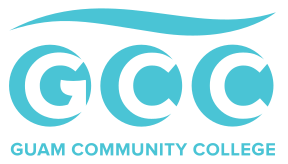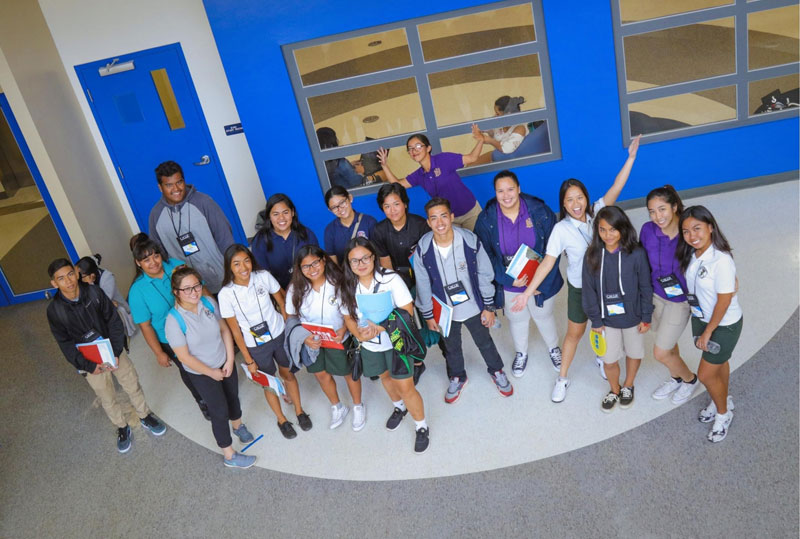Distance Education
Distance Education
Section Menu
- You are on...
Main Page for Distance Education
Distance Education
Guam Community College's emerging Distance Education Program aims to deliver quality postsecondary education to students online. To register for a DE course as a student, log onto MyGCC. If you are a new student, contact gcc.registrar@guamcc.edu, or visit the Admissions & Registration Office, 1st floor, Building 1000, GCC campus.
-------------------------------------
Courses offered:
Online
Online is defined by the Accrediting Commission for Community and Junior Colleges (ACCJC) as a course with instruction delivered to students separated from the instructor and includes regular and substantive interaction between students and instructor.
Hybrid
Hybrid is defined as a course being partially taught via the web (online) and partially on campus.
Courses Offered
Please go to the Schedule of Classes page to open a link to a pdf document of the chosen semester. The section for postsecondary online/hybrid courses is listed at the beginning right after the Adult Education classes.
Additional information for each course can be found using our Online Catalog. Please note that only people residing on Guam will be eligible to take these courses.
-------------------------------------
Advantages of Distance Education:
- Distance education courses allow students to work on their own time rather than report to class at a particular time.
- Travel time and expense is greatly reduced.
- Distance education courses allow students to work from home or office.
- Students who prefer written communication may do well in distance education courses.
- Students may get to know faculty and other students on a deeper level in an online course since many are more inhibited in a classroom setting.
Disadvantages of Distance Education:
- Distance education students may miss the face-to-face interaction with students and instructor.
- Students who are not disciplined and self-motivated may find it a challenge to keep up in a distance education course.
- Students who are poor typists or who are lacking in technical skills may be at a disadvantage in a distance education course.
- Distance education courses may actually take more time than a traditional course.
- Students may experience occasional difficulty to immediately reach other classmates and/or instructor through technology.
What skills do I need to succeed in a distance education course?
People who are successful at distance education possess two categories of skills: technical skills and study skills. For technical skills, you should know basic word processing, how to send and receive emails, how to send and receive attachments, be able to navigate the Web, and have basic knowledge of Macintosh or Windows operating systems. As for study skills, you should be self-motivated, be able to manage your time well, have good communication skills and be diligent. Patience and a sense of humor are also helpful!
Is there anything I need to know about the devices I can use to access this class?
GCC uses Moodle, a Learning Management System for all its online classes. To run Moodle effectively you should, as a minimum, use the system components listed here. If you do not, Moodle may still work but some functionality may not.
Environment Considerations
Your home or workplace environments' internal wired or wireless network and system configurations can also restrict the functionality of Moodle. Access to content may be affected, as may the possibility of uploading files. File size limitations may also apply. Operating system
Recommended Windows 7, Windows 8, Mac OSX Yosemite, iPad or other iOS8 mobile devices.At present, the Moodle Mobile app is not supported due to poor performance. We recommend that on a mobile device you log in to GUAM COMMUNITY COLLEGE Moodle using the web browser unless you are completing an assessment or activity that has a grading component. If you are completing an assessment or activity that has a grading component we recommend that you use Moodle through a desktop or laptop browser.
Internet speed
Use a broadband connection (256 Kbit/sec or faster as this will ensure that you can view videos and online presentations) through USB wireless modem, ADSL, T1/T2, fiber optic or cable. Dial-up access will be significantly slower and we do not recommend it for using Moodle.Internet browsers
Compatible browsers include: Google Chrome 32 bit version 38 or later (recommended for optimal compatibility, this has been thoroughly tested on Windows) Safari 8 or later (recommended for optimal compatibility, this has been thoroughly tested on Mac) Mozilla Firefox 35.0 or later Note that add-ons and toolbars can affect any browser's performance. MS Internet Explorer is not recommended.If you have any difficulty accessing GUAM COMMUNITY COLLEGE Moodle, ensure that you are using one of the supported browsers above before you contact helpdesk support. If you are using MS Internet Explorer 9 and experience problems accessing Moodle, visit this page to fix site display and get some technical information on what to do.
Settings
We recommend that the following be enabled:Cookies Pop-ups (in both Internet browser and security software)
Javascript
Plug-ins
We recommend that you use the latest version of Adobe Flash Player. Please note that iOS products iPhone, iPad, etc. do not support Flash natively but there are web browsers available in the App store that do.)
Content and Resources viewing
We recommend that you use the latest version of Adobe Acrobat Reader. To view all the resources uploaded to Moodle, you will probably need to have Microsoft Office (Word, Excel, PowerPoint) or an equivalent (e.g. Open Office, Viewer) installed.Security
As with all software or hardware firewalls, ensure that you enable uploading of files. Install and maintain an updated antivirus software.Prepare Yourself
Know how to use productivity software
You will need to use productivity software to complete assignments. If you are not familiar with how to use productivity software, then work through some tutorials before the first class date. Or, if you perform a quick Web search, you will definitely be able to find great, free tutorials. Here a two:
MS Office Tutorials – Microsoft’s own training site.
MS Office 2000 Tutorials – Provided by Florida Gulf Coast University, these free tutorials teach the basics of using MS Office Suite.
MS Office Tutorials – Microsoft’s own training site.
MS Office 2000 Tutorials – Provided by Florida Gulf Coast University, these free tutorials teach the basics of using MS Office Suite.
Your email account and how to email attachments
GCC provides you with an email account. You should know how to send an attachment to your email account. It is likely that your professor will require you to email your assignments to him or her using email.
Learn about chat
The informal word “chat” can be misleading. Chat refers to how you will have real-time discussions with your professors and classmates during your online class meetings. Using chat is very easy, but if you are not familiar with how to chat, then it would be worth your time to learn a little about it before your first online class meeting. Here is a resource for chat:
Chat Tutorial – View a short tutorial showing how to use the chat function in an online course.
Chat Tutorial – View a short tutorial showing how to use the chat function in an online course.
Know how to log into your course
Most agree that it is important to know in advance which building your face-to-face class will meet in. Why wouldn’t it be the same for your online course? You should always remember to locate and familiarize yourself with an online class before it begins. Do not wait until just before the class starts to log into the course and find the appropriate chat. Use the username and password provided by your institution a couple days before the first class meeting to explore the course environment. This preparation will also provide you the opportunity to identify and eliminate any technical issues.
Open the communication lines with your professors
Frequent communication with your professors and classmates is essential to having a rewarding online educational experience. Before, or soon after, your first class, send your professor an email. Introduce yourself and provide a little information about yourself and your reasons for being in the course. Almost all professors will welcome and appreciate your efforts to communicate with them.
Prepare your calendar
Finally, make sure you have a calendar. It is always important to outline your time. Schedule your class meetings, homework time and group projects into your calendar. It is a common to allot at least two (2) hours of time per credit hour for class and homework. One of the biggest benefits of online instruction is the flexibility of meeting times and course work. However, do not let all that academic freedom go to your head. It is very important to manage your time wisely by designating specific times for class meetings and homework. If you follow an academic schedule properly, you will have little problem following through with other commitments in your busy schedule.
Some Final Thoughts for the Road
Online education can be an exceptionally rewarding experience, as it offers students the benefits of convenience, quality and academic expression. With the exception of meeting physically for class, online classes differ very little from traditional, face-to-face classes. With a little preparation before your first online class, you will be able to reduce any stress you may be experiencing. More importantly, you will be able to get the most out of your online education.
Before you leave to embark upon your online educational adventure, let’s review the major points. Before your first class, you should:
Before you leave to embark upon your online educational adventure, let’s review the major points. Before your first class, you should:
Prepare Your Device
Web Browser, Flash, Acrobat
Eliminate Spyware and set your browser
Get productivity tools (MS Office, Open Office, viewers)
Eliminate Spyware and set your browser
Get productivity tools (MS Office, Open Office, viewers)
Prepare Yourself
View tutorials on MS Office.
Get an email account and learn how to send attachments.
Learn about chatting.
Log into your course before the first class to familiarize yourself with the system.
Keep the lines of communication open with your instructor.
Know how to get support.
Prepare your calendar for class and homework.
There is one more thing to remember. GCC is dedicated to your success as an online learner.
Hopefully, once completing these tasks, you will feel confident and prepared for your first online course. There is a plentitude of opportunities awaiting you in the world of online education. By enrolling in your first online course, you have taken the first step. Good luck, and make sure to have some fun along the way!
Get an email account and learn how to send attachments.
Learn about chatting.
Log into your course before the first class to familiarize yourself with the system.
Keep the lines of communication open with your instructor.
Know how to get support.
Prepare your calendar for class and homework.
There is one more thing to remember. GCC is dedicated to your success as an online learner.
Hopefully, once completing these tasks, you will feel confident and prepared for your first online course. There is a plentitude of opportunities awaiting you in the world of online education. By enrolling in your first online course, you have taken the first step. Good luck, and make sure to have some fun along the way!
Web Source for some information on this page: http://www.iadl.org.uk/ (Getting Ready for Your First Online Course)
Is distance education useful for everybody? Not necessarily. Click here to find out if you're ready for distance education.
Part of the distance education experience is being able to access all our services on-line as if you were on campus. Please look at this link to see how each of GCC's services can accommodate you.
Two quick videos on how to add or drop classes using MyGCC.



